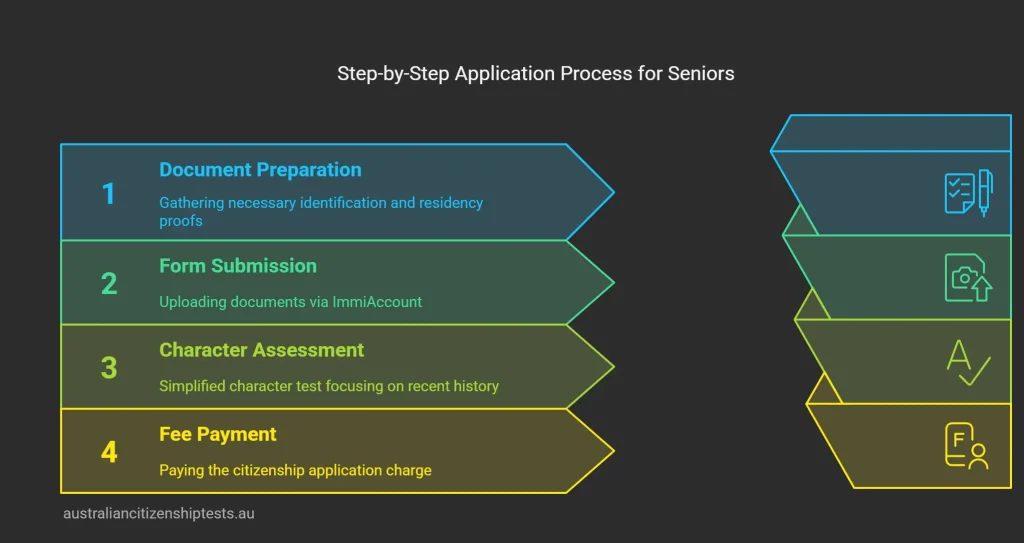
Australia allows seniors aged 60+ to skip the citizenship test to make the process fairer and less stressful. Many older people struggle with learning new languages or have health issues (like hearing loss or arthritis) that make tests harder. For example, a 70-year-old with memory problems might find studying for a test overwhelming. To fix this, a law called the Migration Act 1958 (Section 21) gives seniors a fair chance to become citizens without taking the test.
The Department of Home Affairs follows rules to ensure older applicants are treated kindly. These rules, from the Australian Citizenship Policy Statement, focus on fairness and respect. The Human Rights Commission supports this policy, saying it helps older migrants feel welcome and valued.
Legal Basis for the 60+ Exemption
Australia’s citizenship test exemption for seniors aged 60+ is supported by laws like the Australian Citizenship Act 2007 (Subsection 21(3)), which states that older applicants can skip the test if they meet age requirements.
The Migration Regulations and Legislative Instruments Act 2003 give the government flexibility to adjust rules for older applicants. The Ministerial Discretion power also lets immigration officials make exceptions in special cases, like health issues. These laws work together to ensure fairness while keeping citizenship rules strict.
Who Qualifies for the 60+ Citizenship Test Exemption?
To claim the 60+ exemption, you must prove your age with documents like a birth certificate, passport, or a signed statement (statutory declaration) from someone who knows you. For example, a grandparent could use their old passport if their birth certificate is lost. The Department of Home Affairs accepts these as proof of identity for citizenship.
Key Tips
- Use a passport or birth certificate for fastest approval.
- If documents are missing, submit a statutory declaration with help from a lawyer or trusted adult.
Residency Concessions for Seniors
Reduced Residency Period
Seniors often get flexibility with the 4-year residency rule under the Australian Citizenship Act 2007. Time spent overseas (e.g., family visits or medical trips) might still count toward residency. The Residence Calculator tool helps check eligibility, and some seniors benefit from the “10-year permanent residency rule”, reducing recent residency requirements. Ministerial Discretion allows case-by-case adjustments for fairness.
Good Character Assessment Adjustments
Minor past offenses (e.g., traffic violations) are less likely to block seniors’ applications. While the Character Test (Section 501) applies, officers consider age and context. For example, a 70-year-old with a decades-old speeding ticket would likely pass. The Administrative Appeals Tribunal (AAT) or Ministerial Intervention Unit can review unfair decisions, ensuring age-based criminal record leniency.
Step-by-Step Application Process for Seniors
Seniors over 60 apply via Form 1300t (citizenship application) through ImmiAccount, ensuring all documents meet Department of Home Affairs guidelines.

Required Documents Checklist
Submit core ID and residency proofs, plus specialized documents if records are incomplete.
Core Documents
- Passport, birth certificate, or proof of residency (e.g., utility bills).
- Identity Declaration (Form 1195) signed by an eligible referee (e.g., doctor or lawyer).
- Upload via ImmiAccount to meet senior citizenship document checklist rules.
Example: A 68-year-old uses their expired passport and a bank statement for essential ID verification.
Specialized Documents for Seniors
- Statutory declarations (under the Statutory Declaration Act 1959) for lost/missing records (e.g., a destroyed birth certificate).
- Overseas police certificates (if lived abroad) cross-checked via the Immigration Records Database.
- National Police Check exemptions for minor offenses under senior document flexibility policies.
Simplified Character Requirements
The Character Test (Section 501) focuses on recent criminal history (last 10 years), not lifetime checks. For instance, a 65-year-old with a 15-year-old minor traffic violation would likely pass. The Administrative Appeals Tribunal (AAT) or Ministerial Discretion can override unfair denials.
Fee Structure and Concessions
- Citizenship Application Charge (CAC): $490 AUD (no senior discount).
- Pensioners can request payment plans via Centrelink under the Department of Home Affairs Payment Plan Policy.
Benefits of Citizenship for Seniors
Australian citizenship provides seniors aged 60+ with enhanced healthcare access, financial security, and civic engagement rights.
Access to Social Services
Citizenship unlocks critical support systems managed by Services Australia and the Department of Health and Aged Care.
Medicare and Aged Care
- Full Medicare coverage, including subsidized services under the Pharmaceutical Benefits Scheme (PBS).
- Access to My Aged Care programs for home support, nursing, and mobility aids.
Pension Entitlements
- Eligibility for the Age Pension and Disability Support Pension via Centrelink, governed by the Age Pension Act.
- Protections under the Superannuation Guarantee to safeguard retirement savings.
Voting Rights and Civic Participation
- Voting in elections managed by the Australian Electoral Commission (AEC) and Federal and State Election Commissions.
- Automatic exemptions from jury duty under Jury Duty Exemption Regulations.
Limitations and Considerations
Seniors with Australian citizenship cannot easily sponsor adult children or extended family to live in Australia. This is because of strict rules under visas like the Parent Visa (Subclass 103) and Contributory Parent Visa (Subclass 143). The Department of Home Affairs uses the Balance of Family Test—a rule that checks if most of your children already live in Australia—to decide who qualifies.
Dual Citizenship Implications
Having citizenship in two countries might affect your pension or benefits. For example, if you get money from another country’s pension, Centrelink (Australia’s welfare agency) could reduce your payments. Rules like the Age Pension Portability Rules and Social Security Agreements decide how much you can keep. Always check Foreign Pension Regulations to avoid surprises.
FAQs
Is there an age limit to apply for permanent residency?
No, there’s no official age limit. But some visas (like parent visas) have rules that might make it harder for older people. For example, a rule called the Balance of Family Test checks if most of your children already live in Australia.
Can a 60-year-old become an Australian citizen?
Yes! If you’re 60 or older, you don’t need to take the citizenship test. You still have to prove you’ve lived in Australia long enough and have a clean record.
What if a senior fails the citizenship test?
Seniors over 60 don’t take the test, so they can’t fail! For younger applicants, failing means you can try the test again up to 3 times.
Conclusion
Australian citizenship gives seniors over 60 benefits like free healthcare, pension payments, and no citizenship test. But there are limits—like rules that make it hard to bring family to Australia. Always check the Department of Home Affairs website for updates or talk to an expert if you’re unsure.
